Leadership and Ethics in Nursing: A Professional Platform
VerifiedAdded on 2022/12/28
|10
|2774
|53
Essay
AI Summary
This essay examines the critical role of ethics and leadership within the nursing profession, emphasizing the importance of moral principles and patient care. The author reflects on personal experiences from childhood and adulthood to illustrate how ethical values are formed and applied in nursing practices. The essay delves into the influence of these experiences on the author's professional behavior, highlighting the significance of honesty, integrity, and commitment to patient well-being. It also outlines a professional development plan focused on self-assessment, visionary statements, and the establishment of ethical ground rules. The discussion covers various ethical dilemmas faced by nurses and the need for continuous professional development to maintain ethical standards, including the application of beneficence, non-maleficence, and autonomy. The author identifies both positive and negative aspects of the profession and discusses how a well-structured plan can help nurses overcome challenges and enhance their leadership skills within the framework of ethical nursing practices.
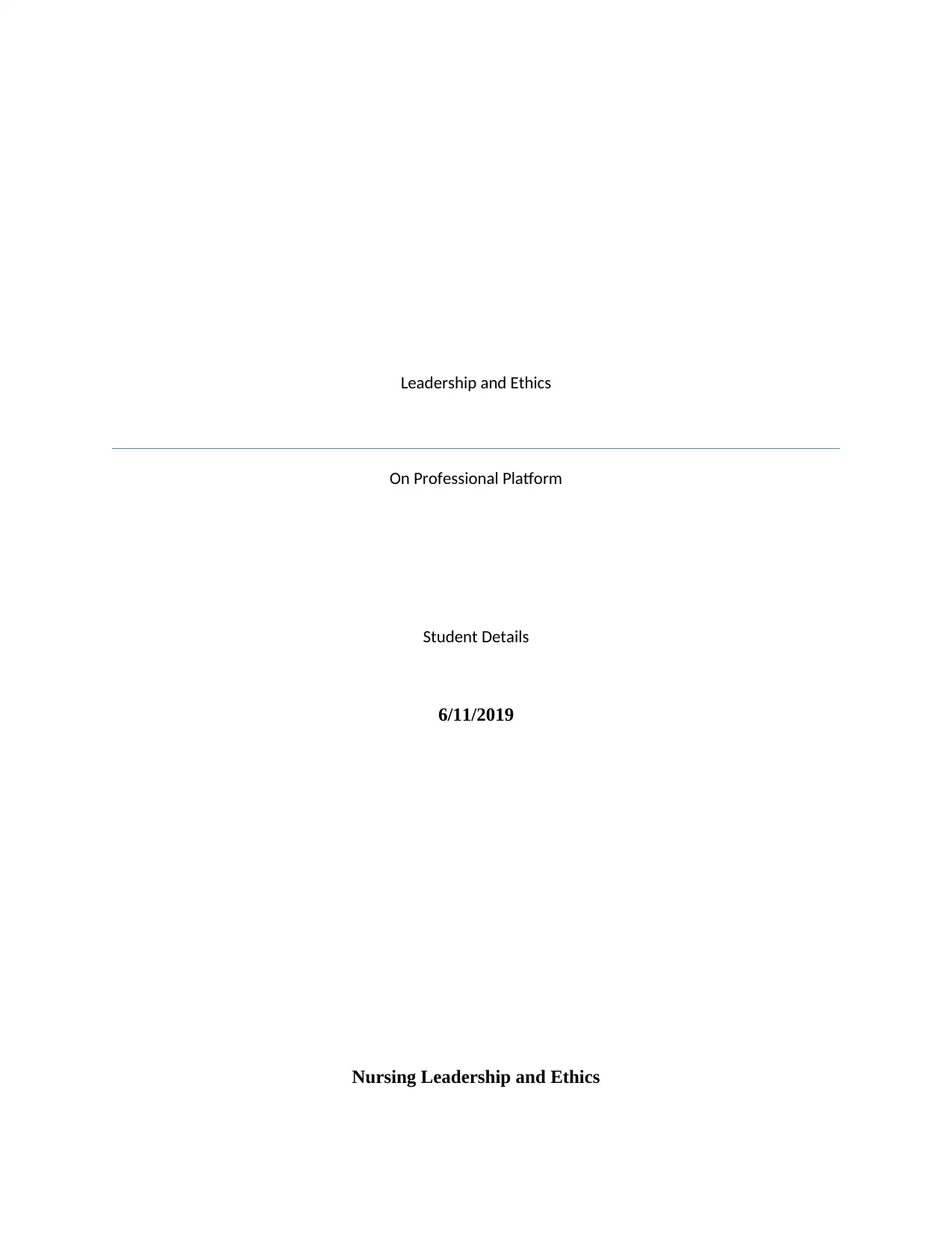
Leadership and Ethics
On Professional Platform
Student Details
6/11/2019
Nursing Leadership and Ethics
On Professional Platform
Student Details
6/11/2019
Nursing Leadership and Ethics
Paraphrase This Document
Need a fresh take? Get an instant paraphrase of this document with our AI Paraphraser
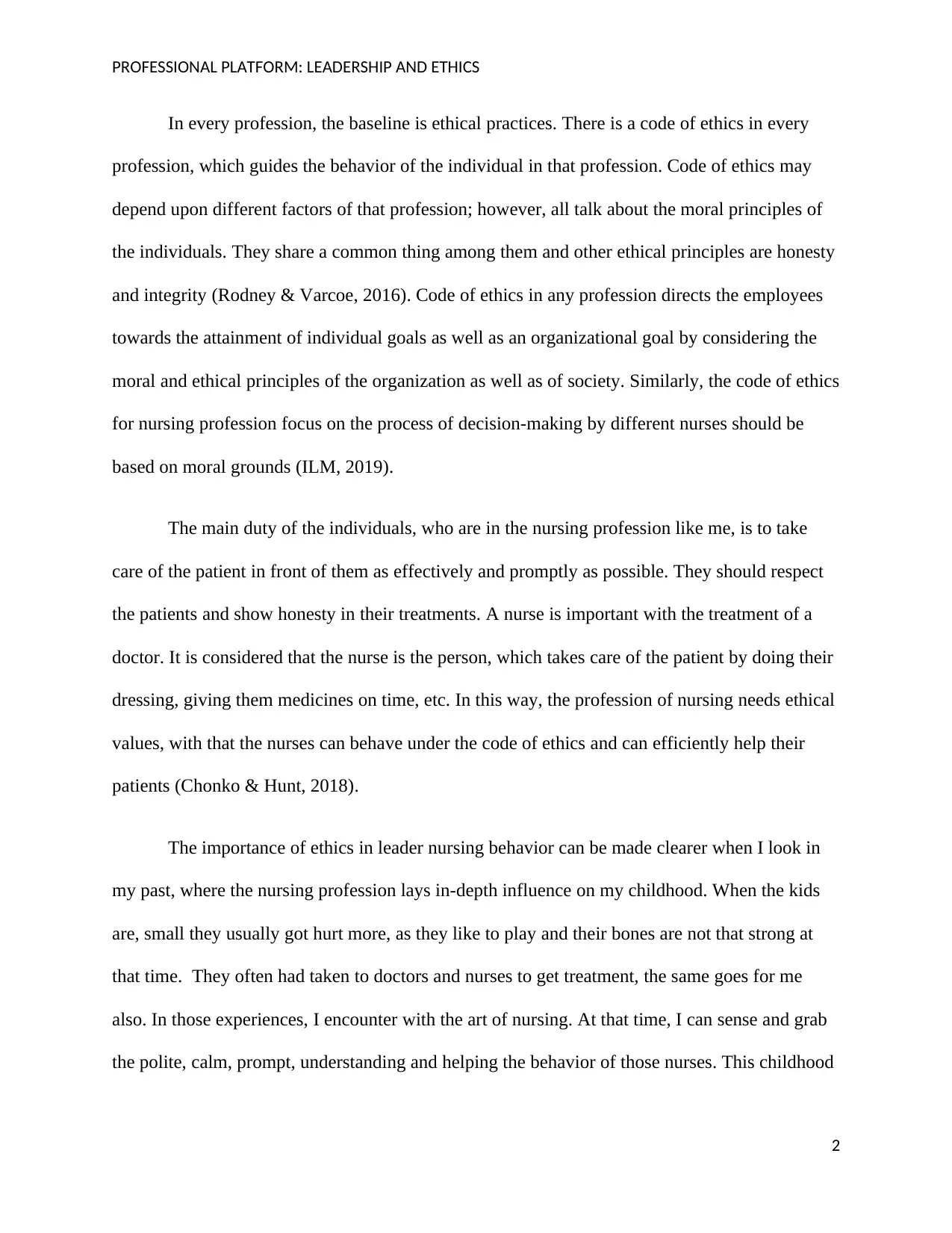
PROFESSIONAL PLATFORM: LEADERSHIP AND ETHICS
In every profession, the baseline is ethical practices. There is a code of ethics in every
profession, which guides the behavior of the individual in that profession. Code of ethics may
depend upon different factors of that profession; however, all talk about the moral principles of
the individuals. They share a common thing among them and other ethical principles are honesty
and integrity (Rodney & Varcoe, 2016). Code of ethics in any profession directs the employees
towards the attainment of individual goals as well as an organizational goal by considering the
moral and ethical principles of the organization as well as of society. Similarly, the code of ethics
for nursing profession focus on the process of decision-making by different nurses should be
based on moral grounds (ILM, 2019).
The main duty of the individuals, who are in the nursing profession like me, is to take
care of the patient in front of them as effectively and promptly as possible. They should respect
the patients and show honesty in their treatments. A nurse is important with the treatment of a
doctor. It is considered that the nurse is the person, which takes care of the patient by doing their
dressing, giving them medicines on time, etc. In this way, the profession of nursing needs ethical
values, with that the nurses can behave under the code of ethics and can efficiently help their
patients (Chonko & Hunt, 2018).
The importance of ethics in leader nursing behavior can be made clearer when I look in
my past, where the nursing profession lays in-depth influence on my childhood. When the kids
are, small they usually got hurt more, as they like to play and their bones are not that strong at
that time. They often had taken to doctors and nurses to get treatment, the same goes for me
also. In those experiences, I encounter with the art of nursing. At that time, I can sense and grab
the polite, calm, prompt, understanding and helping the behavior of those nurses. This childhood
2
In every profession, the baseline is ethical practices. There is a code of ethics in every
profession, which guides the behavior of the individual in that profession. Code of ethics may
depend upon different factors of that profession; however, all talk about the moral principles of
the individuals. They share a common thing among them and other ethical principles are honesty
and integrity (Rodney & Varcoe, 2016). Code of ethics in any profession directs the employees
towards the attainment of individual goals as well as an organizational goal by considering the
moral and ethical principles of the organization as well as of society. Similarly, the code of ethics
for nursing profession focus on the process of decision-making by different nurses should be
based on moral grounds (ILM, 2019).
The main duty of the individuals, who are in the nursing profession like me, is to take
care of the patient in front of them as effectively and promptly as possible. They should respect
the patients and show honesty in their treatments. A nurse is important with the treatment of a
doctor. It is considered that the nurse is the person, which takes care of the patient by doing their
dressing, giving them medicines on time, etc. In this way, the profession of nursing needs ethical
values, with that the nurses can behave under the code of ethics and can efficiently help their
patients (Chonko & Hunt, 2018).
The importance of ethics in leader nursing behavior can be made clearer when I look in
my past, where the nursing profession lays in-depth influence on my childhood. When the kids
are, small they usually got hurt more, as they like to play and their bones are not that strong at
that time. They often had taken to doctors and nurses to get treatment, the same goes for me
also. In those experiences, I encounter with the art of nursing. At that time, I can sense and grab
the polite, calm, prompt, understanding and helping the behavior of those nurses. This childhood
2
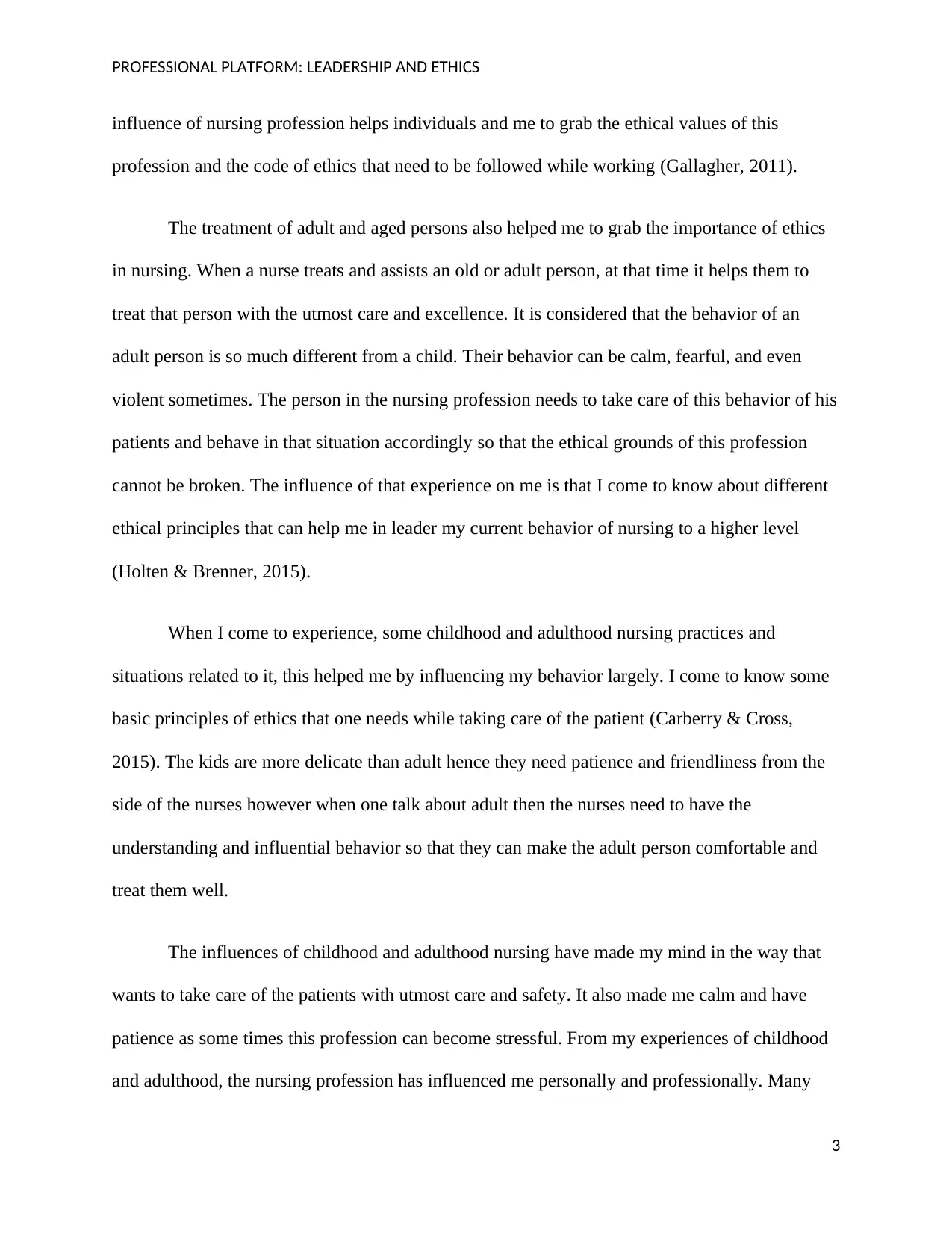
PROFESSIONAL PLATFORM: LEADERSHIP AND ETHICS
influence of nursing profession helps individuals and me to grab the ethical values of this
profession and the code of ethics that need to be followed while working (Gallagher, 2011).
The treatment of adult and aged persons also helped me to grab the importance of ethics
in nursing. When a nurse treats and assists an old or adult person, at that time it helps them to
treat that person with the utmost care and excellence. It is considered that the behavior of an
adult person is so much different from a child. Their behavior can be calm, fearful, and even
violent sometimes. The person in the nursing profession needs to take care of this behavior of his
patients and behave in that situation accordingly so that the ethical grounds of this profession
cannot be broken. The influence of that experience on me is that I come to know about different
ethical principles that can help me in leader my current behavior of nursing to a higher level
(Holten & Brenner, 2015).
When I come to experience, some childhood and adulthood nursing practices and
situations related to it, this helped me by influencing my behavior largely. I come to know some
basic principles of ethics that one needs while taking care of the patient (Carberry & Cross,
2015). The kids are more delicate than adult hence they need patience and friendliness from the
side of the nurses however when one talk about adult then the nurses need to have the
understanding and influential behavior so that they can make the adult person comfortable and
treat them well.
The influences of childhood and adulthood nursing have made my mind in the way that
wants to take care of the patients with utmost care and safety. It also made me calm and have
patience as some times this profession can become stressful. From my experiences of childhood
and adulthood, the nursing profession has influenced me personally and professionally. Many
3
influence of nursing profession helps individuals and me to grab the ethical values of this
profession and the code of ethics that need to be followed while working (Gallagher, 2011).
The treatment of adult and aged persons also helped me to grab the importance of ethics
in nursing. When a nurse treats and assists an old or adult person, at that time it helps them to
treat that person with the utmost care and excellence. It is considered that the behavior of an
adult person is so much different from a child. Their behavior can be calm, fearful, and even
violent sometimes. The person in the nursing profession needs to take care of this behavior of his
patients and behave in that situation accordingly so that the ethical grounds of this profession
cannot be broken. The influence of that experience on me is that I come to know about different
ethical principles that can help me in leader my current behavior of nursing to a higher level
(Holten & Brenner, 2015).
When I come to experience, some childhood and adulthood nursing practices and
situations related to it, this helped me by influencing my behavior largely. I come to know some
basic principles of ethics that one needs while taking care of the patient (Carberry & Cross,
2015). The kids are more delicate than adult hence they need patience and friendliness from the
side of the nurses however when one talk about adult then the nurses need to have the
understanding and influential behavior so that they can make the adult person comfortable and
treat them well.
The influences of childhood and adulthood nursing have made my mind in the way that
wants to take care of the patients with utmost care and safety. It also made me calm and have
patience as some times this profession can become stressful. From my experiences of childhood
and adulthood, the nursing profession has influenced me personally and professionally. Many
3
⊘ This is a preview!⊘
Do you want full access?
Subscribe today to unlock all pages.

Trusted by 1+ million students worldwide
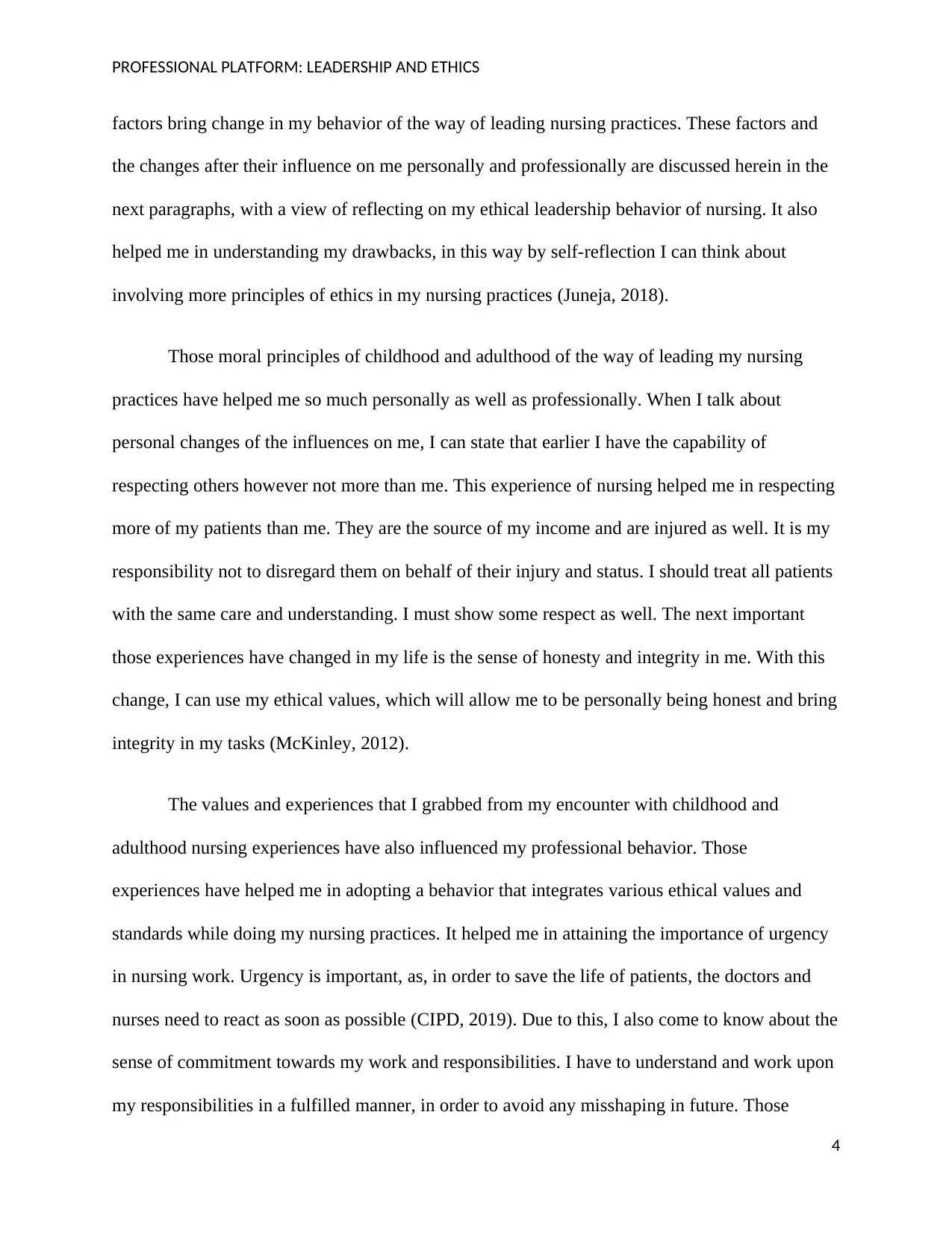
PROFESSIONAL PLATFORM: LEADERSHIP AND ETHICS
factors bring change in my behavior of the way of leading nursing practices. These factors and
the changes after their influence on me personally and professionally are discussed herein in the
next paragraphs, with a view of reflecting on my ethical leadership behavior of nursing. It also
helped me in understanding my drawbacks, in this way by self-reflection I can think about
involving more principles of ethics in my nursing practices (Juneja, 2018).
Those moral principles of childhood and adulthood of the way of leading my nursing
practices have helped me so much personally as well as professionally. When I talk about
personal changes of the influences on me, I can state that earlier I have the capability of
respecting others however not more than me. This experience of nursing helped me in respecting
more of my patients than me. They are the source of my income and are injured as well. It is my
responsibility not to disregard them on behalf of their injury and status. I should treat all patients
with the same care and understanding. I must show some respect as well. The next important
those experiences have changed in my life is the sense of honesty and integrity in me. With this
change, I can use my ethical values, which will allow me to be personally being honest and bring
integrity in my tasks (McKinley, 2012).
The values and experiences that I grabbed from my encounter with childhood and
adulthood nursing experiences have also influenced my professional behavior. Those
experiences have helped me in adopting a behavior that integrates various ethical values and
standards while doing my nursing practices. It helped me in attaining the importance of urgency
in nursing work. Urgency is important, as, in order to save the life of patients, the doctors and
nurses need to react as soon as possible (CIPD, 2019). Due to this, I also come to know about the
sense of commitment towards my work and responsibilities. I have to understand and work upon
my responsibilities in a fulfilled manner, in order to avoid any misshaping in future. Those
4
factors bring change in my behavior of the way of leading nursing practices. These factors and
the changes after their influence on me personally and professionally are discussed herein in the
next paragraphs, with a view of reflecting on my ethical leadership behavior of nursing. It also
helped me in understanding my drawbacks, in this way by self-reflection I can think about
involving more principles of ethics in my nursing practices (Juneja, 2018).
Those moral principles of childhood and adulthood of the way of leading my nursing
practices have helped me so much personally as well as professionally. When I talk about
personal changes of the influences on me, I can state that earlier I have the capability of
respecting others however not more than me. This experience of nursing helped me in respecting
more of my patients than me. They are the source of my income and are injured as well. It is my
responsibility not to disregard them on behalf of their injury and status. I should treat all patients
with the same care and understanding. I must show some respect as well. The next important
those experiences have changed in my life is the sense of honesty and integrity in me. With this
change, I can use my ethical values, which will allow me to be personally being honest and bring
integrity in my tasks (McKinley, 2012).
The values and experiences that I grabbed from my encounter with childhood and
adulthood nursing experiences have also influenced my professional behavior. Those
experiences have helped me in adopting a behavior that integrates various ethical values and
standards while doing my nursing practices. It helped me in attaining the importance of urgency
in nursing work. Urgency is important, as, in order to save the life of patients, the doctors and
nurses need to react as soon as possible (CIPD, 2019). Due to this, I also come to know about the
sense of commitment towards my work and responsibilities. I have to understand and work upon
my responsibilities in a fulfilled manner, in order to avoid any misshaping in future. Those
4
Paraphrase This Document
Need a fresh take? Get an instant paraphrase of this document with our AI Paraphraser
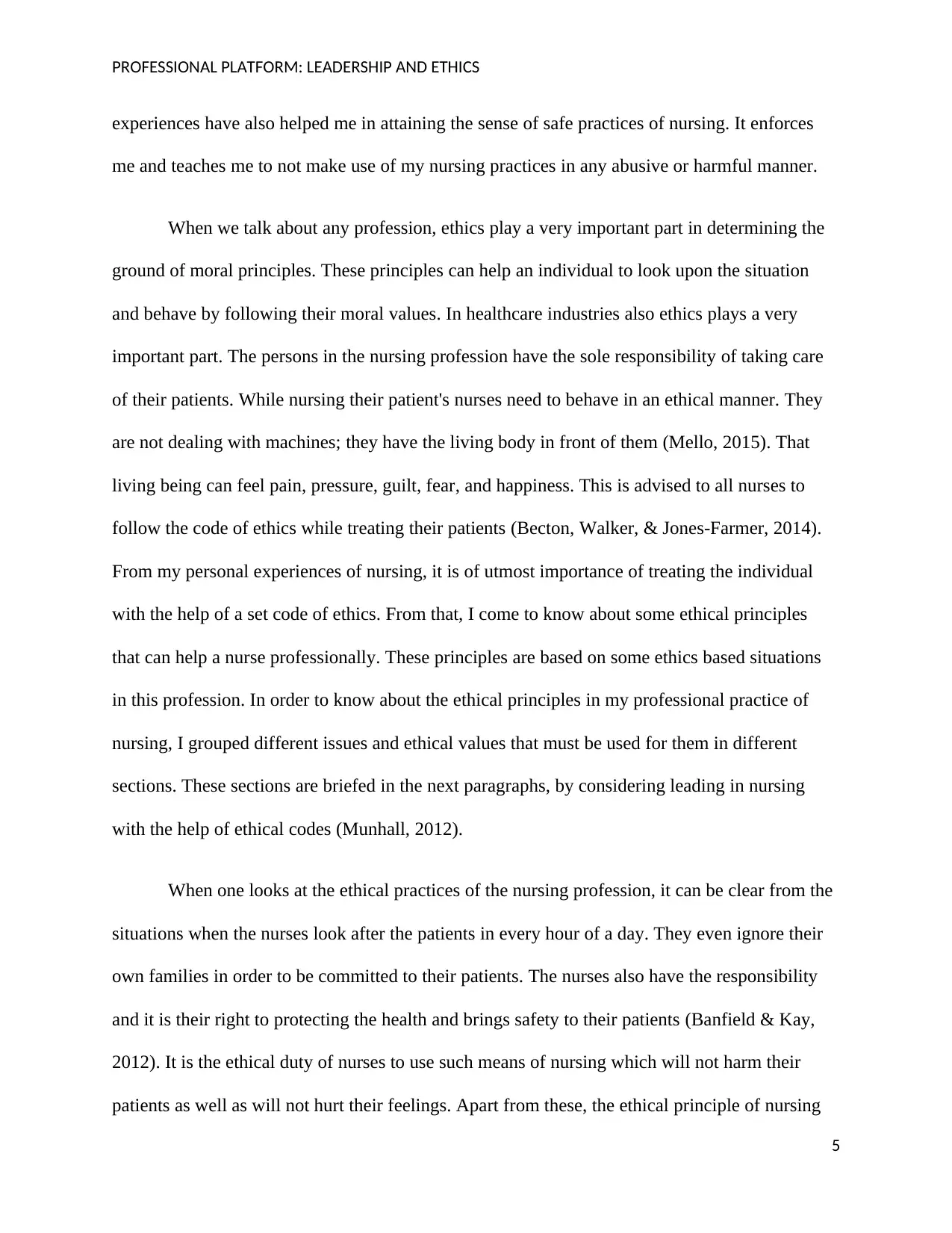
PROFESSIONAL PLATFORM: LEADERSHIP AND ETHICS
experiences have also helped me in attaining the sense of safe practices of nursing. It enforces
me and teaches me to not make use of my nursing practices in any abusive or harmful manner.
When we talk about any profession, ethics play a very important part in determining the
ground of moral principles. These principles can help an individual to look upon the situation
and behave by following their moral values. In healthcare industries also ethics plays a very
important part. The persons in the nursing profession have the sole responsibility of taking care
of their patients. While nursing their patient's nurses need to behave in an ethical manner. They
are not dealing with machines; they have the living body in front of them (Mello, 2015). That
living being can feel pain, pressure, guilt, fear, and happiness. This is advised to all nurses to
follow the code of ethics while treating their patients (Becton, Walker, & Jones‐Farmer, 2014).
From my personal experiences of nursing, it is of utmost importance of treating the individual
with the help of a set code of ethics. From that, I come to know about some ethical principles
that can help a nurse professionally. These principles are based on some ethics based situations
in this profession. In order to know about the ethical principles in my professional practice of
nursing, I grouped different issues and ethical values that must be used for them in different
sections. These sections are briefed in the next paragraphs, by considering leading in nursing
with the help of ethical codes (Munhall, 2012).
When one looks at the ethical practices of the nursing profession, it can be clear from the
situations when the nurses look after the patients in every hour of a day. They even ignore their
own families in order to be committed to their patients. The nurses also have the responsibility
and it is their right to protecting the health and brings safety to their patients (Banfield & Kay,
2012). It is the ethical duty of nurses to use such means of nursing which will not harm their
patients as well as will not hurt their feelings. Apart from these, the ethical principle of nursing
5
experiences have also helped me in attaining the sense of safe practices of nursing. It enforces
me and teaches me to not make use of my nursing practices in any abusive or harmful manner.
When we talk about any profession, ethics play a very important part in determining the
ground of moral principles. These principles can help an individual to look upon the situation
and behave by following their moral values. In healthcare industries also ethics plays a very
important part. The persons in the nursing profession have the sole responsibility of taking care
of their patients. While nursing their patient's nurses need to behave in an ethical manner. They
are not dealing with machines; they have the living body in front of them (Mello, 2015). That
living being can feel pain, pressure, guilt, fear, and happiness. This is advised to all nurses to
follow the code of ethics while treating their patients (Becton, Walker, & Jones‐Farmer, 2014).
From my personal experiences of nursing, it is of utmost importance of treating the individual
with the help of a set code of ethics. From that, I come to know about some ethical principles
that can help a nurse professionally. These principles are based on some ethics based situations
in this profession. In order to know about the ethical principles in my professional practice of
nursing, I grouped different issues and ethical values that must be used for them in different
sections. These sections are briefed in the next paragraphs, by considering leading in nursing
with the help of ethical codes (Munhall, 2012).
When one looks at the ethical practices of the nursing profession, it can be clear from the
situations when the nurses look after the patients in every hour of a day. They even ignore their
own families in order to be committed to their patients. The nurses also have the responsibility
and it is their right to protecting the health and brings safety to their patients (Banfield & Kay,
2012). It is the ethical duty of nurses to use such means of nursing which will not harm their
patients as well as will not hurt their feelings. Apart from these, the ethical principle of nursing
5
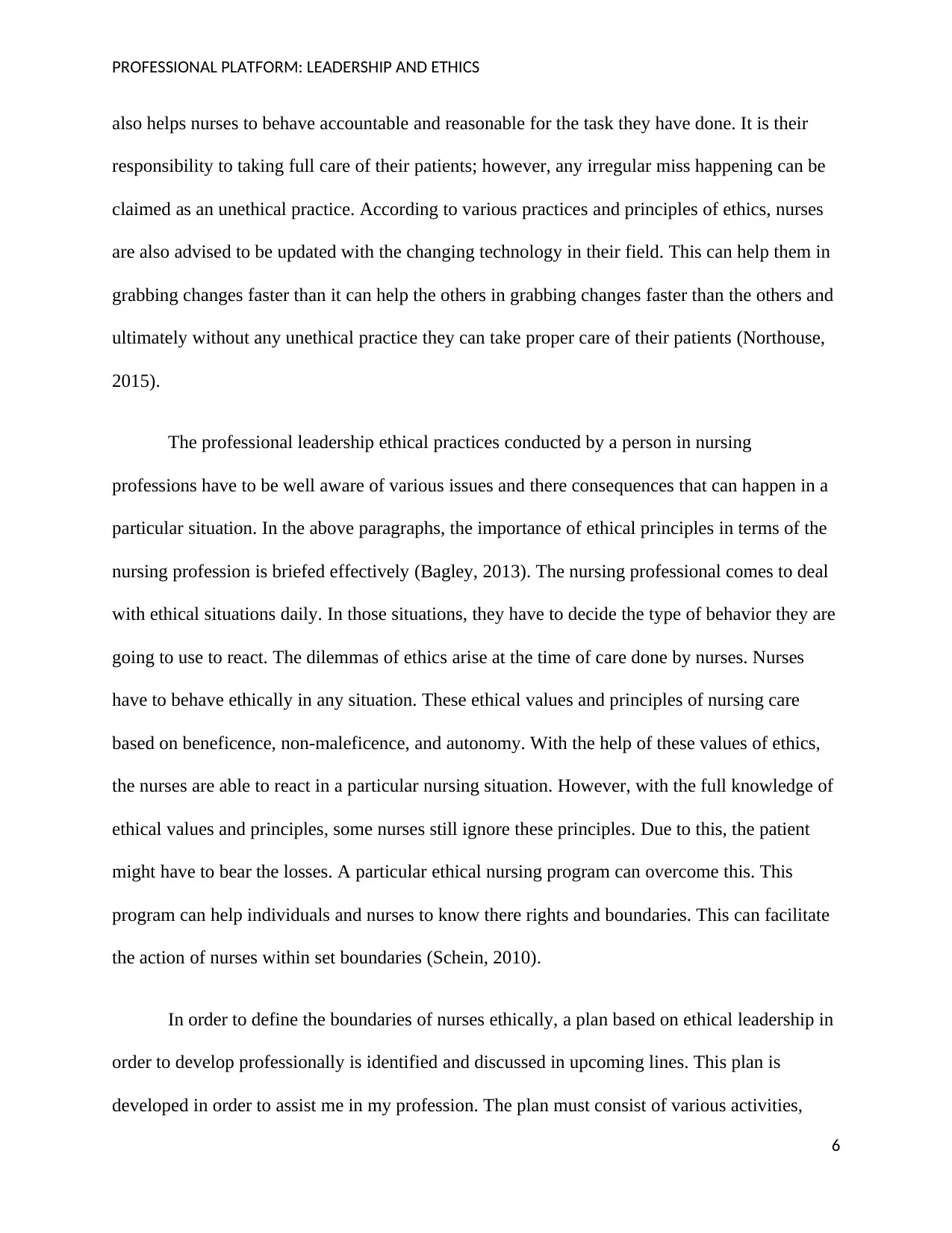
PROFESSIONAL PLATFORM: LEADERSHIP AND ETHICS
also helps nurses to behave accountable and reasonable for the task they have done. It is their
responsibility to taking full care of their patients; however, any irregular miss happening can be
claimed as an unethical practice. According to various practices and principles of ethics, nurses
are also advised to be updated with the changing technology in their field. This can help them in
grabbing changes faster than it can help the others in grabbing changes faster than the others and
ultimately without any unethical practice they can take proper care of their patients (Northouse,
2015).
The professional leadership ethical practices conducted by a person in nursing
professions have to be well aware of various issues and there consequences that can happen in a
particular situation. In the above paragraphs, the importance of ethical principles in terms of the
nursing profession is briefed effectively (Bagley, 2013). The nursing professional comes to deal
with ethical situations daily. In those situations, they have to decide the type of behavior they are
going to use to react. The dilemmas of ethics arise at the time of care done by nurses. Nurses
have to behave ethically in any situation. These ethical values and principles of nursing care
based on beneficence, non-maleficence, and autonomy. With the help of these values of ethics,
the nurses are able to react in a particular nursing situation. However, with the full knowledge of
ethical values and principles, some nurses still ignore these principles. Due to this, the patient
might have to bear the losses. A particular ethical nursing program can overcome this. This
program can help individuals and nurses to know there rights and boundaries. This can facilitate
the action of nurses within set boundaries (Schein, 2010).
In order to define the boundaries of nurses ethically, a plan based on ethical leadership in
order to develop professionally is identified and discussed in upcoming lines. This plan is
developed in order to assist me in my profession. The plan must consist of various activities,
6
also helps nurses to behave accountable and reasonable for the task they have done. It is their
responsibility to taking full care of their patients; however, any irregular miss happening can be
claimed as an unethical practice. According to various practices and principles of ethics, nurses
are also advised to be updated with the changing technology in their field. This can help them in
grabbing changes faster than it can help the others in grabbing changes faster than the others and
ultimately without any unethical practice they can take proper care of their patients (Northouse,
2015).
The professional leadership ethical practices conducted by a person in nursing
professions have to be well aware of various issues and there consequences that can happen in a
particular situation. In the above paragraphs, the importance of ethical principles in terms of the
nursing profession is briefed effectively (Bagley, 2013). The nursing professional comes to deal
with ethical situations daily. In those situations, they have to decide the type of behavior they are
going to use to react. The dilemmas of ethics arise at the time of care done by nurses. Nurses
have to behave ethically in any situation. These ethical values and principles of nursing care
based on beneficence, non-maleficence, and autonomy. With the help of these values of ethics,
the nurses are able to react in a particular nursing situation. However, with the full knowledge of
ethical values and principles, some nurses still ignore these principles. Due to this, the patient
might have to bear the losses. A particular ethical nursing program can overcome this. This
program can help individuals and nurses to know there rights and boundaries. This can facilitate
the action of nurses within set boundaries (Schein, 2010).
In order to define the boundaries of nurses ethically, a plan based on ethical leadership in
order to develop professionally is identified and discussed in upcoming lines. This plan is
developed in order to assist me in my profession. The plan must consist of various activities,
6
⊘ This is a preview!⊘
Do you want full access?
Subscribe today to unlock all pages.

Trusted by 1+ million students worldwide
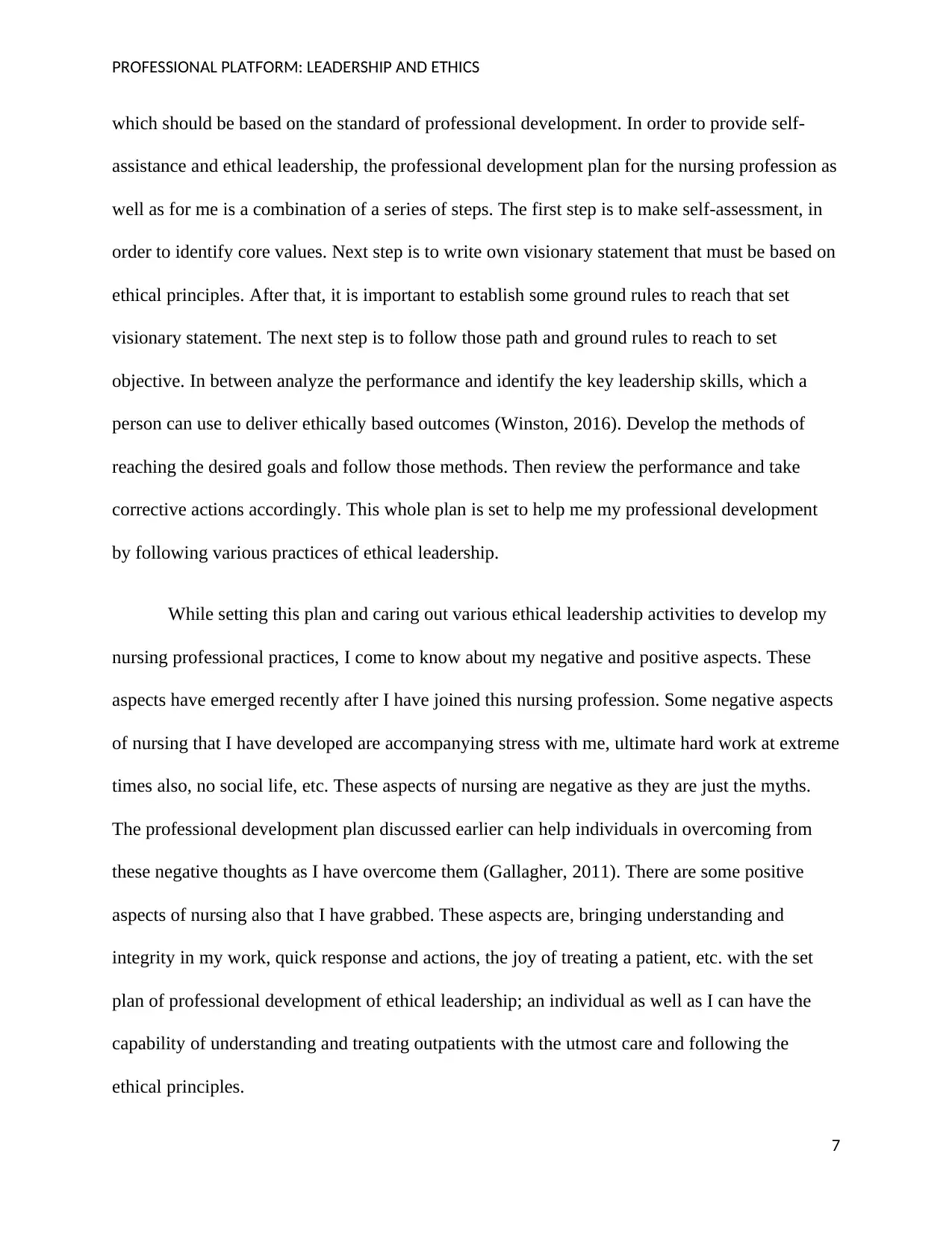
PROFESSIONAL PLATFORM: LEADERSHIP AND ETHICS
which should be based on the standard of professional development. In order to provide self-
assistance and ethical leadership, the professional development plan for the nursing profession as
well as for me is a combination of a series of steps. The first step is to make self-assessment, in
order to identify core values. Next step is to write own visionary statement that must be based on
ethical principles. After that, it is important to establish some ground rules to reach that set
visionary statement. The next step is to follow those path and ground rules to reach to set
objective. In between analyze the performance and identify the key leadership skills, which a
person can use to deliver ethically based outcomes (Winston, 2016). Develop the methods of
reaching the desired goals and follow those methods. Then review the performance and take
corrective actions accordingly. This whole plan is set to help me my professional development
by following various practices of ethical leadership.
While setting this plan and caring out various ethical leadership activities to develop my
nursing professional practices, I come to know about my negative and positive aspects. These
aspects have emerged recently after I have joined this nursing profession. Some negative aspects
of nursing that I have developed are accompanying stress with me, ultimate hard work at extreme
times also, no social life, etc. These aspects of nursing are negative as they are just the myths.
The professional development plan discussed earlier can help individuals in overcoming from
these negative thoughts as I have overcome them (Gallagher, 2011). There are some positive
aspects of nursing also that I have grabbed. These aspects are, bringing understanding and
integrity in my work, quick response and actions, the joy of treating a patient, etc. with the set
plan of professional development of ethical leadership; an individual as well as I can have the
capability of understanding and treating outpatients with the utmost care and following the
ethical principles.
7
which should be based on the standard of professional development. In order to provide self-
assistance and ethical leadership, the professional development plan for the nursing profession as
well as for me is a combination of a series of steps. The first step is to make self-assessment, in
order to identify core values. Next step is to write own visionary statement that must be based on
ethical principles. After that, it is important to establish some ground rules to reach that set
visionary statement. The next step is to follow those path and ground rules to reach to set
objective. In between analyze the performance and identify the key leadership skills, which a
person can use to deliver ethically based outcomes (Winston, 2016). Develop the methods of
reaching the desired goals and follow those methods. Then review the performance and take
corrective actions accordingly. This whole plan is set to help me my professional development
by following various practices of ethical leadership.
While setting this plan and caring out various ethical leadership activities to develop my
nursing professional practices, I come to know about my negative and positive aspects. These
aspects have emerged recently after I have joined this nursing profession. Some negative aspects
of nursing that I have developed are accompanying stress with me, ultimate hard work at extreme
times also, no social life, etc. These aspects of nursing are negative as they are just the myths.
The professional development plan discussed earlier can help individuals in overcoming from
these negative thoughts as I have overcome them (Gallagher, 2011). There are some positive
aspects of nursing also that I have grabbed. These aspects are, bringing understanding and
integrity in my work, quick response and actions, the joy of treating a patient, etc. with the set
plan of professional development of ethical leadership; an individual as well as I can have the
capability of understanding and treating outpatients with the utmost care and following the
ethical principles.
7
Paraphrase This Document
Need a fresh take? Get an instant paraphrase of this document with our AI Paraphraser
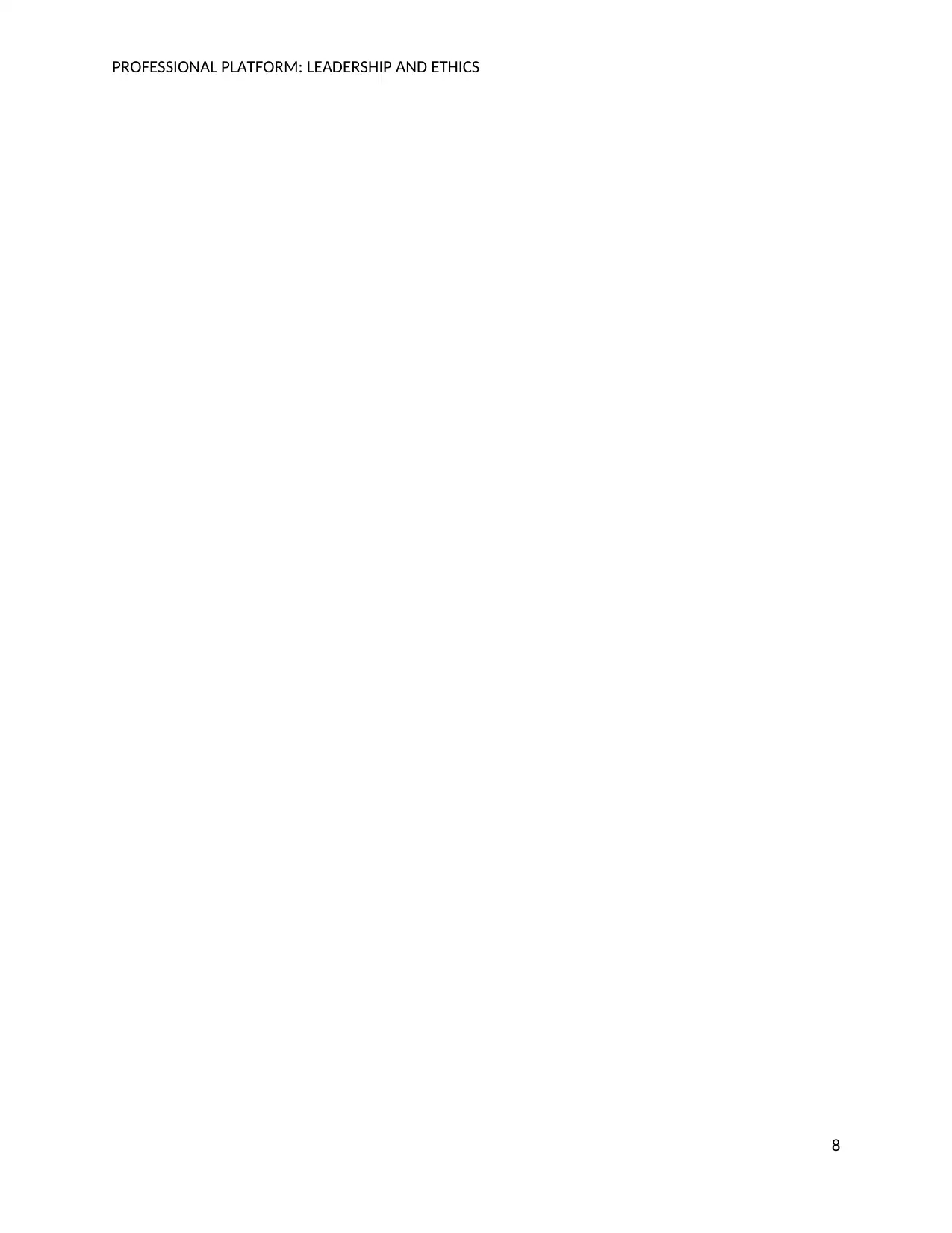
PROFESSIONAL PLATFORM: LEADERSHIP AND ETHICS
8
8
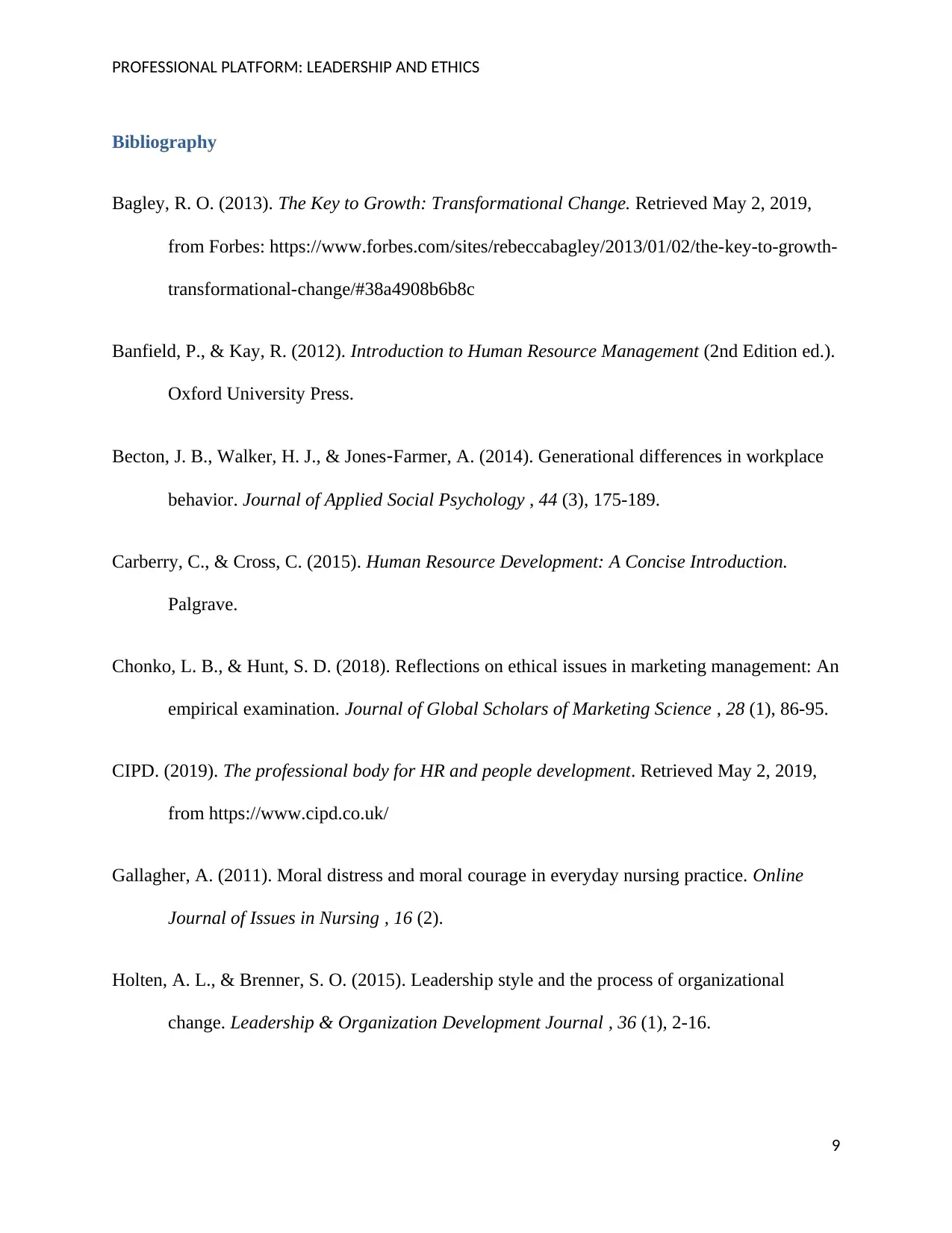
PROFESSIONAL PLATFORM: LEADERSHIP AND ETHICS
Bibliography
Bagley, R. O. (2013). The Key to Growth: Transformational Change. Retrieved May 2, 2019,
from Forbes: https://www.forbes.com/sites/rebeccabagley/2013/01/02/the-key-to-growth-
transformational-change/#38a4908b6b8c
Banfield, P., & Kay, R. (2012). Introduction to Human Resource Management (2nd Edition ed.).
Oxford University Press.
Becton, J. B., Walker, H. J., & Jones‐Farmer, A. (2014). Generational differences in workplace
behavior. Journal of Applied Social Psychology , 44 (3), 175-189.
Carberry, C., & Cross, C. (2015). Human Resource Development: A Concise Introduction.
Palgrave.
Chonko, L. B., & Hunt, S. D. (2018). Reflections on ethical issues in marketing management: An
empirical examination. Journal of Global Scholars of Marketing Science , 28 (1), 86-95.
CIPD. (2019). The professional body for HR and people development. Retrieved May 2, 2019,
from https://www.cipd.co.uk/
Gallagher, A. (2011). Moral distress and moral courage in everyday nursing practice. Online
Journal of Issues in Nursing , 16 (2).
Holten, A. L., & Brenner, S. O. (2015). Leadership style and the process of organizational
change. Leadership & Organization Development Journal , 36 (1), 2-16.
9
Bibliography
Bagley, R. O. (2013). The Key to Growth: Transformational Change. Retrieved May 2, 2019,
from Forbes: https://www.forbes.com/sites/rebeccabagley/2013/01/02/the-key-to-growth-
transformational-change/#38a4908b6b8c
Banfield, P., & Kay, R. (2012). Introduction to Human Resource Management (2nd Edition ed.).
Oxford University Press.
Becton, J. B., Walker, H. J., & Jones‐Farmer, A. (2014). Generational differences in workplace
behavior. Journal of Applied Social Psychology , 44 (3), 175-189.
Carberry, C., & Cross, C. (2015). Human Resource Development: A Concise Introduction.
Palgrave.
Chonko, L. B., & Hunt, S. D. (2018). Reflections on ethical issues in marketing management: An
empirical examination. Journal of Global Scholars of Marketing Science , 28 (1), 86-95.
CIPD. (2019). The professional body for HR and people development. Retrieved May 2, 2019,
from https://www.cipd.co.uk/
Gallagher, A. (2011). Moral distress and moral courage in everyday nursing practice. Online
Journal of Issues in Nursing , 16 (2).
Holten, A. L., & Brenner, S. O. (2015). Leadership style and the process of organizational
change. Leadership & Organization Development Journal , 36 (1), 2-16.
9
⊘ This is a preview!⊘
Do you want full access?
Subscribe today to unlock all pages.

Trusted by 1+ million students worldwide
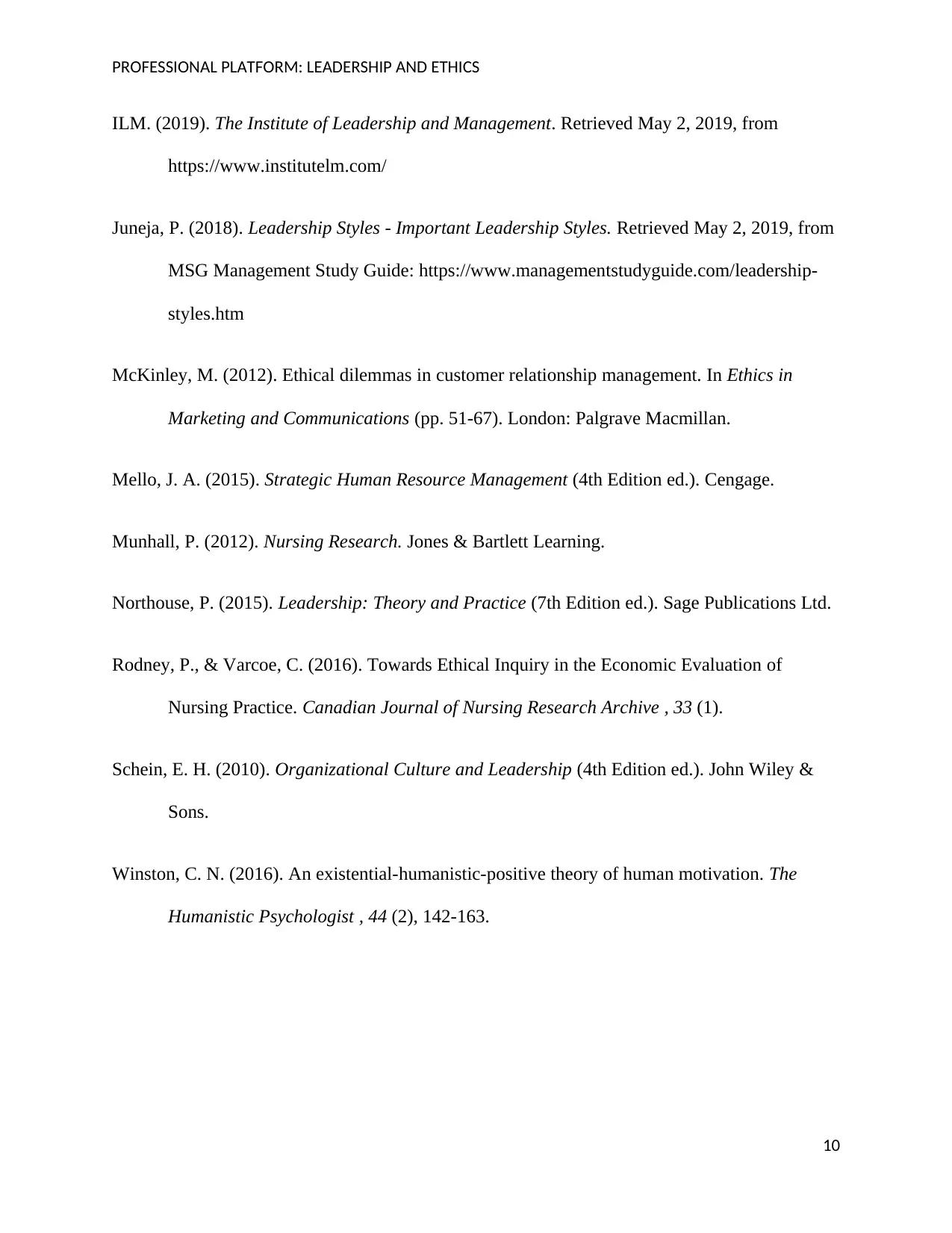
PROFESSIONAL PLATFORM: LEADERSHIP AND ETHICS
ILM. (2019). The Institute of Leadership and Management. Retrieved May 2, 2019, from
https://www.institutelm.com/
Juneja, P. (2018). Leadership Styles - Important Leadership Styles. Retrieved May 2, 2019, from
MSG Management Study Guide: https://www.managementstudyguide.com/leadership-
styles.htm
McKinley, M. (2012). Ethical dilemmas in customer relationship management. In Ethics in
Marketing and Communications (pp. 51-67). London: Palgrave Macmillan.
Mello, J. A. (2015). Strategic Human Resource Management (4th Edition ed.). Cengage.
Munhall, P. (2012). Nursing Research. Jones & Bartlett Learning.
Northouse, P. (2015). Leadership: Theory and Practice (7th Edition ed.). Sage Publications Ltd.
Rodney, P., & Varcoe, C. (2016). Towards Ethical Inquiry in the Economic Evaluation of
Nursing Practice. Canadian Journal of Nursing Research Archive , 33 (1).
Schein, E. H. (2010). Organizational Culture and Leadership (4th Edition ed.). John Wiley &
Sons.
Winston, C. N. (2016). An existential-humanistic-positive theory of human motivation. The
Humanistic Psychologist , 44 (2), 142-163.
10
ILM. (2019). The Institute of Leadership and Management. Retrieved May 2, 2019, from
https://www.institutelm.com/
Juneja, P. (2018). Leadership Styles - Important Leadership Styles. Retrieved May 2, 2019, from
MSG Management Study Guide: https://www.managementstudyguide.com/leadership-
styles.htm
McKinley, M. (2012). Ethical dilemmas in customer relationship management. In Ethics in
Marketing and Communications (pp. 51-67). London: Palgrave Macmillan.
Mello, J. A. (2015). Strategic Human Resource Management (4th Edition ed.). Cengage.
Munhall, P. (2012). Nursing Research. Jones & Bartlett Learning.
Northouse, P. (2015). Leadership: Theory and Practice (7th Edition ed.). Sage Publications Ltd.
Rodney, P., & Varcoe, C. (2016). Towards Ethical Inquiry in the Economic Evaluation of
Nursing Practice. Canadian Journal of Nursing Research Archive , 33 (1).
Schein, E. H. (2010). Organizational Culture and Leadership (4th Edition ed.). John Wiley &
Sons.
Winston, C. N. (2016). An existential-humanistic-positive theory of human motivation. The
Humanistic Psychologist , 44 (2), 142-163.
10
1 out of 10
Related Documents
Your All-in-One AI-Powered Toolkit for Academic Success.
+13062052269
info@desklib.com
Available 24*7 on WhatsApp / Email
![[object Object]](/_next/static/media/star-bottom.7253800d.svg)
Unlock your academic potential
Copyright © 2020–2026 A2Z Services. All Rights Reserved. Developed and managed by ZUCOL.



